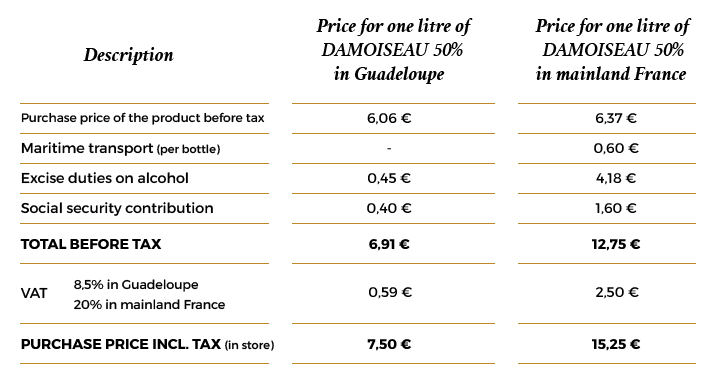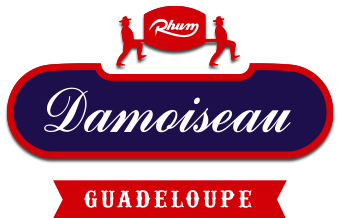The French Antilles and Réunion are subject to a special taxation regime for rums.
Here are the details:
Frequently asked questions
about Damoiseau rum
Why is rum more expensive on the mainland than in the Antilles?

Why go through a distributor for overseas, and what rules apply?
The laws in force in every country around the world require that excise duties and taxes on alcohol be paid where it is consumed and not where it is produced or shipped. Consequently, we are required by law to go through a fiscally approved distributor who pays the duties and taxes applicable in their country before making our products available for consumption. This is why it is impossible for us to ship rum directly to an individual or company located overseas if they do not have fiscal approval.
How can I obtain 4.5-litre bag-in-boxes?
You have two options:
- You can go in to a METRO store that sells 4.5-litre bag-in-boxes of Damoiseau rum
- You can order online (exclusively reserved for shipping to mainland France)
Is it possible to come to your warehouses in the Paris region?
It would be a pleasure if you could visit us. Unfortunately, our warehouses in the Paris region are subject to some very strict legislation (Installation Classée pour la Protection de l’Environnement), and do not have the necessary certification for public access buildings.
Why are your products sometimes out of stock?
We make every effort to stock sufficient quantities of each of our products to meet your needs by carefully planning our supplies in advance. All our products are bottled in Guadeloupe and do not undergo either modification or further processing on their arrival on the mainland. They are 100% ‘péyi’ (local).
That being said, we sometimes – and totally unpredictably – suffer the consequences of social movements in Guadeloupe (e.g. strikes at the only port, lorry driver strikes, service station strikes… or general strikes lasting 44 days like in 2009!). Despite having invested in larger storage capacities in mainland France, if such disturbances go on too long, inevitably there comes a time when we are out of stock.
To make matters worse, in the event of a port strike in Guadeloupe (which is frequent and never covered by the media on the mainland), the ships offload our containers of empty bottles anywhere in the Caribbean, so we have to recover them one by one from Trinidad to Puerto Rico before we can resume operations on our bottling lines.
All of this results in delays, which we have fortunately been able to reduce since the 2009 strike, but not completely eliminate…
I would like to open my own rum bar or store. Who should I talk to?
It would be best to talk to our wholesale distributors. At our logistics base in the Paris region, we exclusively process large volumes with full pallets which we ship to our regional wholesalers so as to minimise logistics, as this soon becomes very expensive.
I would like to start a macerated rum business. Could you supply me with rum in bulk?
Our company does not supply rum in bulk. All our products are packaged in bottles (350 ml to 1.5 litres) and bag-in-boxes (3 litres to 5 litres) on site in Guadeloupe.
What is the difference between rhum agricole and industrial rum? Does Guadeloupe produce industrial rum?
The difference between rhum agricole and industrial rum is mainly related to two factors:
– Rhum agricole is distilled from pure pressed cane juice, whereas industrial rum is produced from molasses wash, an organic by-product of sugar production. Many countries that do not grow sugar cane buy molasses from cane-producing countries to manufacture industrial rum.
– The other difference is the kind of still used: a Creole column still for rhum agricole (handmade or semi-handmade) and a multi-column still for industrial rum.
In terms of taste and smell, rhum agricole can be distinguished by its floral, vegetal scent and natural complexity and mildness, and a minimum volatile substances content of 225 g per hectolitre of pure alcohol in the rum. The production process for industrial rum is completely automated and results in an alcohol with a low volatile substances content and a rather dry spirit, which is mainly used as a base for making cocktails.
Guadeloupe’s Geographical Indication authorises the production of two kinds of rum, neither of which can be described as ‘industrial’. Guadeloupean rum is a rum whose entire production process is carried out within the geographical area consisting of the French department of Guadeloupe. It can be ‘traditionnel agricole’ (traditional rhum agricole) – 100% pure fermented distilled cane juice – or ‘traditionnel de sucrerie’ (traditional from sugar refinery), distilled from molasses sourced from local sugar production.
Unlike industrial rum, traditional rum from Guadeloupe – whether it is agricole or de sucrerie – has a high volatile substances content thanks to Creole distillation, which results in the fruity, floral, soft, mineral rum we all love.


